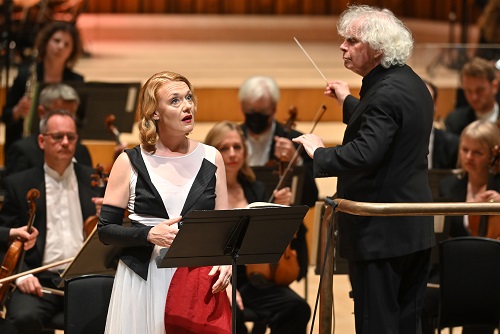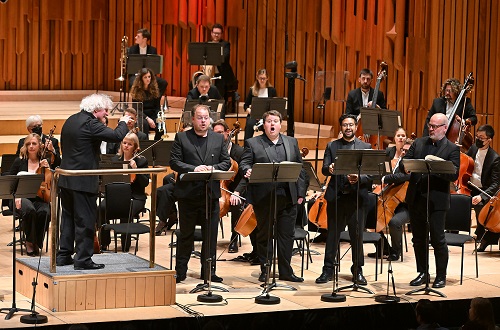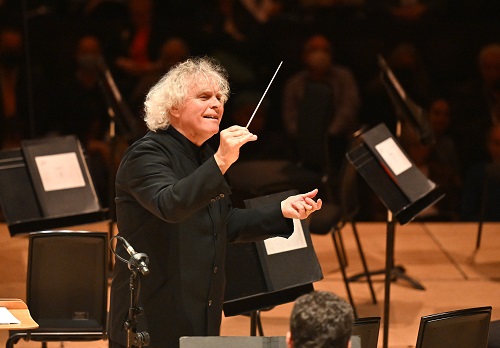The Seven Deadly Sins is perhaps the most interesting of the collaborations between Kurt Weill and Berthold Brecht. Composed ‘post-rift’ in 1933, this ballet chanté is sophisticated both musically and theatrically. Anna I (a soprano) and Anna II (a female dancer) leave their home in Louisiana in search of fame and fortune, travelling to Memphis, Los Angeles, Philadelphia, Boston, Tennessee, San Francisco and eventually returning home – a journey which enables Brecht to deliver a catalogue of bitter indictments of human nature and social institutions. A quartet of preachy parents and brothers form a Greek chorus commenting on the Annas’ progress, urging them to avoid the deadly sins and make a lot of money.

The ’duality’ of the Annas is the core of a work which juxtaposes sin and virtue, cabaret and opera, materialism and art. And, in this performance at the Barbican Hall with the London Symphony Orchestra and Sir Simon Rattle, in the absence of a dancer mezzo-soprano Magdalena Kožená brilliantly captured both sides of the single coin in her portrayal of Anna I’s plain rationality – driven by her family’s pursuit of wealth and the American Dream – and Anna II’s charm, unpredictability and vulnerability in the face of their bourgeois ambition. Kožená’s suave delivery of the German text was telling. There were no theatrical histrionics just self-knowing directness and a sometimes painful honesty. The exterior was tough, but the cracks let us see the softness beneath the surface. The result was that Brecht’s censures were not so much placard slogans as poetry.
Tenors Andrew Staples and Alessandro Fisher, baritone Ross Ramgobin and bass-baritone Florian Boesch hectored with ironic ebullience and spot-on intonation, forming a slick barbershop group and Italianate operatic quartet. Rattle, like his wife Kožená, eschewed hyperbole, preferring to let the details of the score – the soft percussive thuds of Sloth; the sensual swaying of Pride’s waltz; the dry staccato of Anger; the brassy brashness of Lust – speak for themselves. The LSO were crisp and clear, the string playing bright and warm, the whole airy and fresh.

The concert began with the Little Threepenny Suite for wind instruments derived from The Threepenny Opera. The LSO musicians played with sparkling precision and attentiveness, but a certain ‘edginess’ or ‘mocking sneer’ seemed missing here. The Stravinskian dryness needs a more acerbic tint, I feel; Rattle seemed to me to sweeten the bitter irony of ‘Mack the Knife’. Divest of the text, the suite becomes a sort of self-parodying Mozartian divertimento, but the virtuosity – and there was plenty of that on show here – feels to me as if it should be rather more cruel. There were some lovely effects and moments, though: the alternating stutter and flow of the ‘Ballad of the Easy Life’; the closing tenderness which countered the exuberance of ‘Polly’s Song’; the growing rhythmic confidence and flair which swelled through the ‘Tango-Ballade’; the transparency and vulnerability of ‘Cannon Song’ before the weighty, chorale-like blocks of the Finale.
Two contrasting vocal works followed. Vom Tod in Wald (Death in the Forest, 1927) is a dark and morbid cantata on a text by Brecht (taken from his play, Baal, in which the protagonist dies three times in three different ways). In the cantata, the bass singer describes the man’s lonely death and his reassimilation back into the natural world. The Stravinskian ambience continued, in the scoring for ten wind instruments and the echoes of L’Histoire du soldat,andFlorian Boesch was an impressive narrator, the sombre vocal line hauntingly accompanied by gaunt, atonal instrumental lines and stark counterpoint. A different kind of loneliness followed, the claustrophobic isolation and desperation of the poor and housebound being the focus of ‘Lonely House’ from Weill’s 1947 musical – or, to use Weill’s preferred description, ‘American opera’ – Street Scene. Andrew Staples beautifully captured both the fragile wistfulness and the foreboding tension while the LSO musicians painted a cityscape of disconnected sounds and splashes.

For the final items in the first half of the programme we stayed in the US, where the exiled Weill settled, with Lotte Lenya, in 1935. A few years later he mentioned to Ira Gershwin that he wanted to compose ‘a book of songs (not popular songs but ‘Lieder’) for concert singers’. The bombing of Pearl Harbour in 1941 prompted him to act on his plans, and he composed three songs setting poems from Walt Whitman’s Leaves of Grass (a fourth song was added in 1947). ‘Beat! Beat! Drums!’ was selected, Weill wrote, because of its ‘extraordinary timeliness … as a passionate call to arms to everybody in the nation’. Aided by the theatricality of the unrelenting rhythm and percussive thump, Ross Ramgobin vigorously conveyed the brutality of war. It was war’s sorrows, though, that were to the fore in ‘Dirge for Two Veterans’, Staples communicating the blunt reality with directness and force, “Two veterans son and father dropt together,/ And the double grave awaits them”, and, with lyrical earnestness, the pathos: “The moon gives you light,/ And the bugles and the drums give you music,/ And my heart, O my soldiers, my veterans,/ My heart gives you love.”
Claire Seymour
Kurt Weill: Little Threepenny Music, Death in the Forest, ‘Lonely House’ from Street Scene, ‘Beat! Beat! Drums!’ and ‘Dirge for Two Veterans’ from Four Walt Whitman Songs, The Seven Deadly Sins
Magdalena Kožená (soprano), Andrew Staples (tenor), Alessandro Fisher (tenor), Ross Ramgobin (bariton), Florian Boesch (bass-baritone) London Symphony Orchestra, Sir Simon Rattle (conductor)
Barbican Hall, London; Thursday 28th April 2022.
ABOVE: Magdalena Kožená and the LSO conducted by Sir Simon Rattle (c) Mark Allan